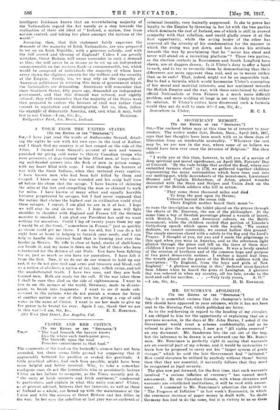A SIGNIFICANT MEMORY.
(To THE EDITOR OF THE " SPECIATOrt.") Sus,—The enclosed letter may at this time be of interest to your readers. The writer under date, Boston, Mass., April 24th, 1917, says that her thoughts have been much with us in these days of liberation from an intolerable neutrality. " Whatever the cost may be, we are now in the war, where some of us believe we should have been ever since the invasion of Belgium." She then adds :— " I write you at this time, however, to tell you of a service of deep spiritual and moral significance, on April 19th, Patriots' Day at Concord. By the rude bridge that arched the flood, where our embattled farmers stood ' in 1776, we gathered together`children representing the many nationalities which have been cast into our melting-pot, w-bile descendants of the minutemen, Lieutenant Homer and Captain Richardson, of Acton, placed wreaths decorated with the Stars and Stripes and Union Jack on the graves of the British soldiers who fell in action.
They came three thousand miles and died To keep the past upon its throne; Unheard beyond the ocean tide Their English mother heard their moan '—
so runs the inscription on the tablet placed on the graves through the efforts of Dr. Emerson, the son of the philosopher. At the same time a boy of Swedish parentage placed a wreath of laurel, with British, French, and American colours, on the Battle monument, while the children recited that portion of Lincoln's Gettysburg speech which opens with the words, 'We cannot dedicate, we cannot consecrate, we cannot hallow this ground.' The simple exercises closed with a salute to the flag and the Lord's Prayer. I thought of you, for you and I made the pilgrimage to. this spot when you were in America, and as the afternoon light glinted through the pines and fell on the faces of these dear children I knew your heart would rejoice. It was a lovely symbol of the reunion of brethren and of the common hope and purpose of two great democratic nations. I enclose a laurel leaf from the wreath placed on the grave of the British soldiers with the. inscription: 'To England, from the boys and girls of New England,' 'A glorious morning is this,' declared stout-hearted Sam Adams when he heard the guns at Lexington. A glorious day was ushered in when my country, all too late, awoke to -the
need and call for sacrifice. . . .—Very truly yours, A. G."


























 Previous page
Previous page